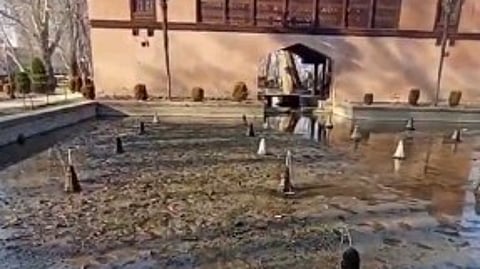

SRINAGAR: The historic spring at the famed Achabal Mughal garden in south Kashmir’s Anantnag district has dried up for the first time in history due to an unprecedented dry spell and minimal rainfall this winter, raising serious concerns about a potential drought-like situation in the summer.
The Achabal spring, built by Noor Jahan, wife of Mughal Emperor Jahangir in the 17th century, has never run dry before, according to locals.
“It is the first time I have seen the spring dried up. I have never seen this situation before,” said 65-year-old villager Ghulam Mohammad.
The spring provides water to nearly 20 villages surrounding the Achabal Mughal garden, and residents are now facing a severe water crisis, relying on water tankers for their supply. The Achabal springs also support 13 water supply schemes, further worsening the situation.
Kashmir has recorded an 80 per cent precipitation deficit in January and February, leading to the drying up of multiple water bodies across the Valley. An official from the Meteorological Department confirmed, “There has been nearly 80 per cent deficient precipitation in the Valley in January and February so far.”
The condition is similar in other parts of south Kashmir. The Aripal spring in Tral, Pulwama, has also completely dried up, along with many other springs in the region. The Aripath stream, originating from Chatapal in Shangus, Kulgam, has met the same fate.
The river Jhelum is experiencing a continuous decline in water levels. At Sangam in south Kashmir, it has dropped to -1.01 feet, which is below the Reduced Level (RL) of zero, while at Ram Munshi Bagh in Srinagar, it has fallen to 3.52 feet. Major tributaries of the Jhelum are also witnessing severe water shortages.
Agriculture and horticulture in south, central, and north Kashmir depend on the Jhelum’s water, and experts warn that the declining water levels could severely impact crop yields. An earth scientist cautioned that the lack of snowfall and scarce rainfall this winter would have serious repercussions on stream flows, which are essential for irrigation.
Experts have warned of a drought-like situation in the summer. Joint Director (Extension) of the Agriculture Department, Sartaj Ahmad Shah, advised farmers to shift to crops that require less water.
“We advise farmers to grow crops that require less water. Instead of paddy, they should consider millets, corn, and pulses,” he said.
Adding to the crisis, persistent dry weather has triggered rampant forest fires across Jammu and Kashmir. Around 50 incidents have been reported in the last fortnight in districts including Baramulla, Bandipora, Budgam, Srinagar, Pulwama, Rajouri, and Poonch.
A massive fire broke out in the Pinglish Shikargah wildlife and forest area of Tral, which has now been extinguished. On 8 February, a forest fire also raged on Shankaracharya Hill overlooking Srinagar, but authorities managed to contain the flames in time.
Environmentalists warn that rising temperatures and extended dry spells may lead to an increase in the frequency and intensity of forest fires in the Valley. They also predict a water and power crisis in the summer.
Reacting to the crisis, Chief Minister Omar Abdullah said, “J&K is staring at a water crisis this year. It’s not a recent phenomenon, actually it’s been building up for a few years now. While the government will have to adopt a more proactive approach for water management & conservation, it can’t just be a government-centric approach.”
“All of us residents of J&K will have to change the way we take water for granted. I’ll be reviewing the measures the Jal Shakti (PHE) Dept intends to take to deal with the developing crisis, & I’ll also be talking to the people of J&K over the next few months about what we can do collectively,” he added.